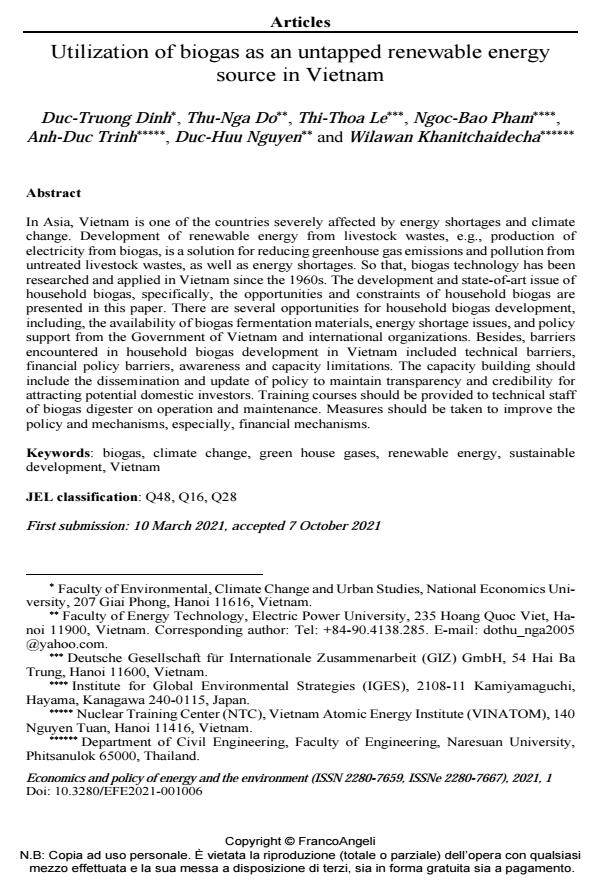Utilization of biogas as an untapped renewable energy source in Vietnam
Titolo Rivista ECONOMICS AND POLICY OF ENERGY AND THE ENVIRONMENT
Autori/Curatori Duc-Truong Dinh, Thu-Nga Do, Thi-Thoa Le, Ngoc-Bao Pham, Anh-Duc Trinh, Duc-Huu Nguyen, Wilawan Khanitchaidecha
Anno di pubblicazione 2021 Fascicolo 2021/1
Lingua Inglese Numero pagine 16 P. 105-120 Dimensione file 321 KB
DOI 10.3280/EFE2021-001006
Il DOI è il codice a barre della proprietà intellettuale: per saperne di più
clicca qui
Qui sotto puoi vedere in anteprima la prima pagina di questo articolo.
Se questo articolo ti interessa, lo puoi acquistare (e scaricare in formato pdf) seguendo le facili indicazioni per acquistare il download credit. Acquista Download Credits per scaricare questo Articolo in formato PDF

FrancoAngeli è membro della Publishers International Linking Association, Inc (PILA), associazione indipendente e non profit per facilitare (attraverso i servizi tecnologici implementati da CrossRef.org) l’accesso degli studiosi ai contenuti digitali nelle pubblicazioni professionali e scientifiche.
In Asia, Vietnam is one of the countries severely affected by energy shortages and climate change. Development of renewable energy from livestock wastes, e.g., production of electricity from biogas, is a solution for reducing greenhouse gas emissions and pollution from untreated livestock wastes, as well as energy shortages. So that, biogas technology has been researched and applied in Vietnam since the 1960s. The development and state-of-art issue of household biogas, specifically, the opportunities and constraints of household biogas are presented in this paper. There are several opportunities for household biogas development, including, the availability of biogas fermentation materials, energy shortage issues, and policy support from the Government of Vietnam and international organizations. Besides, barriers encountered in household biogas development in Vietnam included technical barriers, financial policy barriers, awareness and capacity limitations. The capacity building should include the dissemination and update of policy to maintain transparency and credibility for attracting potential domestic investors. Training courses should be provided to technical staff of biogas digester on operation and maintenance. Measures should be taken to improve the policy and mechanisms, especially, financial mechanisms.
Parole chiave:biogas, climate change, green house gases, renewable energy, sustainable development, Vietnam
Jel codes:Q48, Q16, Q28
- Smart Pig Farming—A Journey Ahead of Vietnam Md Sharifuzzaman, Hong-Seok Mun, Keiven Mark B. Ampode, Eddiemar B. Lagua, Hae-Rang Park, Young-Hwa Kim, Md Kamrul Hasan, Chul-Ju Yang, in Agriculture /2024 pp.555
DOI: 10.3390/agriculture14040555 - Evaluation of prospects and barriers of biogas produced from livestock waste towards sustainable developmentand adaptation to climate change in Nghe An province, Viet Nam Thu-Nga Do, ThiThoa Le, NgocBao Pham, DucTruong Dinh, Duc-Huu Nguyen, Wilawan Khanitchaidecha, in APN Science Bulletin /2021 pp.81
DOI: 10.30852/sb.2021.1587
Duc-Truong Dinh, Thu-Nga Do, Thi-Thoa Le, Ngoc-Bao Pham, Anh-Duc Trinh, Duc-Huu Nguyen, Wilawan Khanitchaidecha, Utilization of biogas as an untapped renewable energy source in Vietnam in "ECONOMICS AND POLICY OF ENERGY AND THE ENVIRONMENT" 1/2021, pp 105-120, DOI: 10.3280/EFE2021-001006